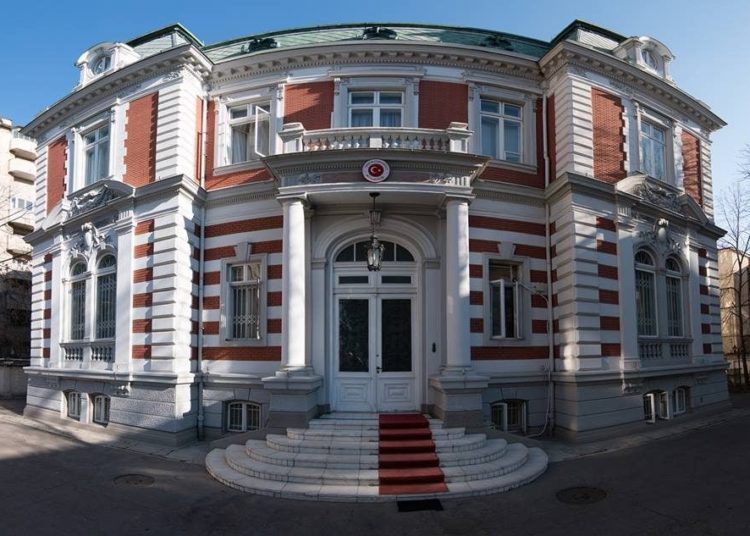Nordic Monitor
Critics of Turkish President Recep Tayyip Erdoğan who are living in Romania had been included in a terrorism probe on fabricated charges by a Turkish prosecutor, judicial documents obtained by Nordic Monitor have revealed.
According to a December 13, 2018 decision by prosecutor Birol Tufan, the Ankara Chief Public Prosecutor’s Office launched a separate investigation (file no. 2018/ 018/27518) into 80 Turkish nationals who were listed in espionage files dispatched by Turkish diplomats in Romania without any concrete evidence of wrongdoing. The documents once more confirmed that spying activities by Turkish diplomatic missions result in serious consequences in the Turkish judicial system.
The investigation included journalists, academics, educators, representatives of local institutions and associations, prominent businessmen and Turkish nationals who have been forced to live in exile or who remain at large in Turkey to escape the regime’s persecution.
According to the documents they were charged with “membership in a terrorist group” by Tufan. The investigation was based on spying files created at the Turkish diplomatic missions in Romania between 2016 and 2018.
The investigation also included educator Fatih Gürsoy, the general manager of Lumina schools in Romania. The Bucharest Court of Appeal had previously denied the extradition of educator Gürsoy on dubious terrorism charges brought by the Erdoğan government. New documents reveal that Ankara might launch a separate extradition process for Gürsoy in accordance with Tufan’s investigation.
Judicial document dated December 13, 2018 reveals spying on critics in Romania by the Turkish diplomatic missions. (The addresses and names of the Turkish nationals have been redacted for security reasons):
The request for the extradition of Gürsoy was based on an arrest warrant issued in absentia on January 12, 2018 by the Ankara 7th Penal Court of Peace for “committing the crime of setting up or running an armed criminal terrorist group as provided by Article 314/1 of the Turkish Penal Code.” The Turkish court accused Gürsoy of setting up or running a supposedly terrorist organization — the Gülen movement — by using the ByLock application under a specific username. ByLock was a mobile messaging app that was downloaded more than 600,000 times from the Google Play Store and the Apple App Store worldwide.
In December 2019 the Bucharest Court of Appeal came to the conclusion that none of the charges leveled against Gürsoy were credible and that the purported evidence against him was not convincing. The Romanian court did not consider using the ByLock messaging application an act of terrorism and defined the extradition request by Turkey as a means of punishment of a person on the grounds of a particular social, political or religious group membership.
In identifying individuals’ links to the movement, the Erdoğan government developed such criteria as using ByLock, owning an account in the movement-affiliated Bank Asya, sending a son or a daughter to a Gülen/Hizmet-operated school, subscribing to the Zaman daily newspaper or other periodicals, making monetary or qurban donations to the movement and organizing charity events to the benefit of the group and the like, based on which tens of thousands people were put behind bars.

Similarly, the Erdoğan government asked Romania in 2018 to extradite journalist Kamil Demirkaya, who was working for the Zaman daily’s Romanian edition in Bucharest after he served as editor-in-chief of Zaman Bulgaria between 2003 and 2011. The Zaman newspaper, the most highly circulated daily in Turkey with 1.2 million copies sold daily at its peak, was seized by the Erdoğan government on trumped-up charges of terrorism in March 2016. The paper was turned into a government mouthpiece overnight and was eventually shut down in July 2016.
Demirkaya’s account at Bank Asya as well as accounts owned by his wife and three children during the 2013-2016 period were presented as evidence to warrant his extradition. The extradition request only listed the bank account balances of the journalist and his family members but failed to specify which transactions constituted a crime, for what purpose and for what terrorist activity.
However, the Constanta Court of Appeal decided on December 14, 2018 that “the conditions for the extradition of Turkish national Kamil Demirkaya have not been met” and dismissed the request lodged by Turkish judicial authorities on the grounds of the European Convention on Extradition (ECE) rules and relevant Romanian laws and regulations. The court stated that Demirkaya had no connection whatsoever to any terrorist activity and that all sympathizers or people believed to be affiliated with the Gülen movement were unjustly detained and tortured.

Turkish diplomatic and consular missions around the world have collected information on Turkish nationals in line with a systematic spying campaign launched after a coup attempt in Turkey in July 2016, listed their names as if they were part of a terrorist organization and transmitted it to headquarters.
As previously disclosed by Nordic Monitor, the foreign ministry sent lists of profiled Turkish nationals in two CDs to the Ankara Chief Public Prosecutor’s Office, the national police and Turkey’s intelligence agency MIT on February 19, 2018 via an official document for further administrative or legal action, the punishment of their relatives back in Turkey and the seizure of their assets.
Then, Public Prosecutor Adem Akıncı, who received the foreign ministry document on February 23, 2018, forwarded the classified CDs including information on 4,386 Erdoğan critics to the Organized Crimes Unit of the Ankara Police Department for further action. The police conveyed the results of its investigations to the public prosecutor.
According to judicial documents released by the Ankara 4th High Criminal Court on January 16, 2019, the foreign ministry compiled a long list of foreign entities that were owned and/or operated by people who were seen as close to the Hizmet/Gülen movement, a group critical of the Turkish government, in 92 countries in the Americas, Europe, Asia and Oceania.
Moreover, Nordic Monitor revealed how MIT infiltrated refugee camps in Greece in order to spy on opponents who were forced to flee to Greece to escape an unprecedented crackdown in neighboring Turkey.












